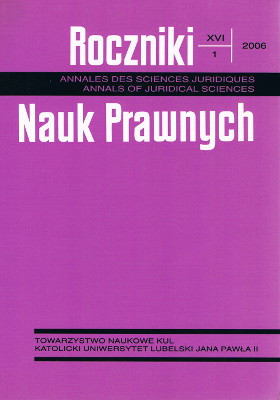Binacja i trynacja Mszy Świętej w koncelebrze w świetle prawa kanonicznego i liturgicznego
Bination and Trination of the Holy Mass in Concelebration in the Light of Canon and Liturgy Law
Author(s): Zbigniew JanczewskiSubject(s): Law, Constitution, Jurisprudence, Canon Law / Church Law
Published by: Towarzystwo Naukowe KUL & Katolicki Uniwersytet Lubelski Jana Pawła II
Keywords: concelebrated Holy Mass; bination; trination
Summary/Abstract: The article shows problems connected with celebrating the Eucharist by a priest for a second and a third time in the course of one day in the light of canon and liturgy regulations. After sketching briefly the preliminaries in the introduction, a historical outline of the issue is presented. In the Latin Church until the Vatican Council II such a situation was in principle inadmissible. In ancient times the presbyters celebrating together with their bishop said the Mass only once a day. In the Middle Ages concelebration was not usually practiced. The possibility of bination and trination has appeared only after the Vatican Council II.The next two parts of the article discuss the regulations of canon law in force now that are connected with the possibility of bining and then trining during concelebration. According to the norms that are in force at present the local ordinaries may give permission for bination (excluding concelebration). Bining connected with mutual celebrating the Mass is provided for in situations defined by the new General Introduction to the Roman Missal. It is similar in the case of trination and concelebration. The local ordinaries permit trination without the right to mutually celebrate one of the three Masses. The priest who exercises such a right may not concelebrate a Mass on the same day. Trination along with concelebration are admissible only by norms contained in the introduction to the missal.In the next item the article presents the ways of concelebrating the Eucharist properly in the light of liturgy regulations, stressing the most often encountered irregularities. Celebrating the liturgy together priests have to remember that the words they say in the Eucharistic prayer are to be uttered aloud only by the main celebrant. The remaining celebrants say them quietly. During the consecration they should reach their hands in a gesture pointing to Christ's Body and Blood.The next parts of the article show the necessity to keep to the canon and liturgical law by concelebrants and the need of the priests' deeper care of celebrating the Mass decently. Ignoring the canon-liturgical regulations when celebrating the Eucharist means committing a seriously base act. This kind of abuses cause, among others, obscuring the faith and the Church's teaching. Holy Masses may not be multiplied against the rules of the law, e.g. in order to put on an impressive show.
Journal: Roczniki Nauk Prawnych
- Issue Year: 16/2006
- Issue No: 1
- Page Range: 285-300
- Page Count: 16
- Language: Polish

